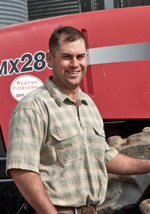
Hold #4 of the MV Global Arrow at mid-day.
Each bag weighs one metric ton.
Each bag weighs one metric ton.
About two years ago, the rice industry's drying and storage sector started to move toward solar conversion. That trend has continued, and today there are more than a dozen large, commercial drying and storage operations in the state operating in part or in total on solar energy. Last December, the ACC and CFF rice mills went online with their fully powered solar operations. As time goes on, the new solar arrays being built are getting larger and larger. Today, many produce more energy than their accompanying facility uses -- they are putting power back into PG&E's grids and running the meters backwards!
I think there are two main reasons for this trend: (1) Finally the economic factors have made it such that, even though there is a significant capital investment required, a return is achievable. This is partially due to legislation passed by the state and federal governments, and partially due to a substantial decrease in construction costs of the arrays over time. (2) Perhaps more importantly, it's the right thing to do. We need to show the public that the agriculture industry is not just the producer. In other words, since end users are demanding more sustainable products with lower carbon footprints and more use of renewable energy, all of agriculture needs to work towards that goal. The burden cannot be placed fully on the producers' backs causing them astronomical increases in input costs. At the processing level, we too need to show that we are willing to do our part in achieving this goal.
One shipload of rice to Japan does not change the world by any stretch of the imagination. But then again, Rome wasn't built in a day.
 Chris Crutchfield
Chris CrutchfieldPresident and CEO -- American Commodity Company
Chris Crutchfield is very proud to represent the third generation of his family to be involved in the rice industry. Currently Chris is involved in all aspects of California rice from production all the way to the grocery store shelf.
Shortly after graduating from the University of Missouri in 1996, Chris moved back to California and joined with his father Paul Crutchfield in the formation of a rough rice pool for direct marketing to Turkey. Chris was responsible for the day-to-day management of the pool. That partnership developed into the formation of American Commodity Company (ACC) in 2000, and Chris assumed all direct management responsibilities for ACC.
Prior to establishing himself in the California rice industry, Chris worked in the press offices of Governor Pete Wilson as his Assistant Press Secretary. He also briefly taught secondary education in the California public school system.

















 Here is a photo of the first class section of my flight to Tokyo. As you can see, it’s me & one other guy. Normally the single American Airlines non-stop between lax and Tokyo daily is jam-packed. My flight attendants say it has been like this since the tragic earthquake and tsunami.
Here is a photo of the first class section of my flight to Tokyo. As you can see, it’s me & one other guy. Normally the single American Airlines non-stop between lax and Tokyo daily is jam-packed. My flight attendants say it has been like this since the tragic earthquake and tsunami.



